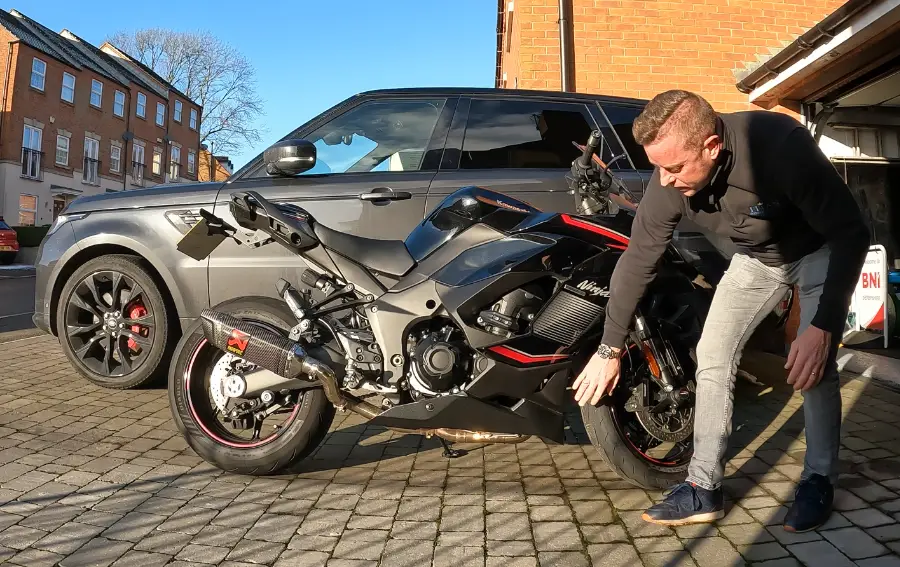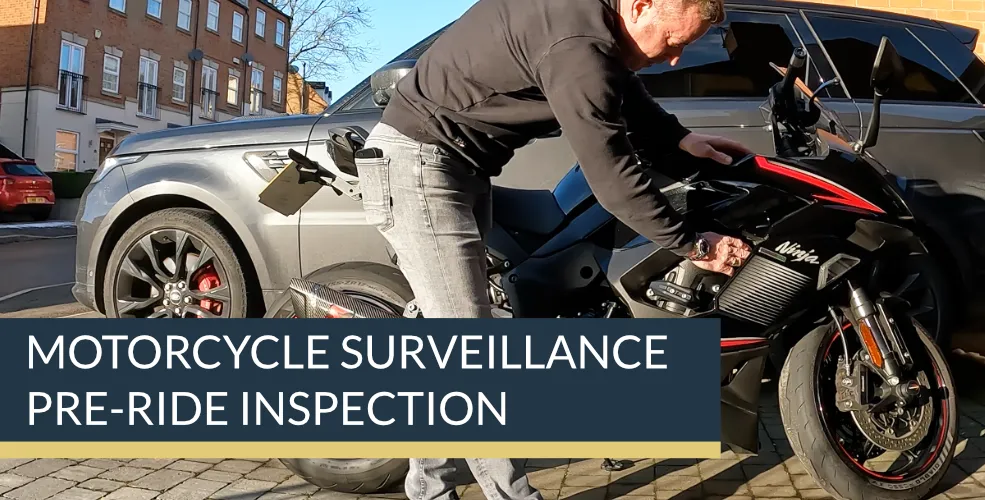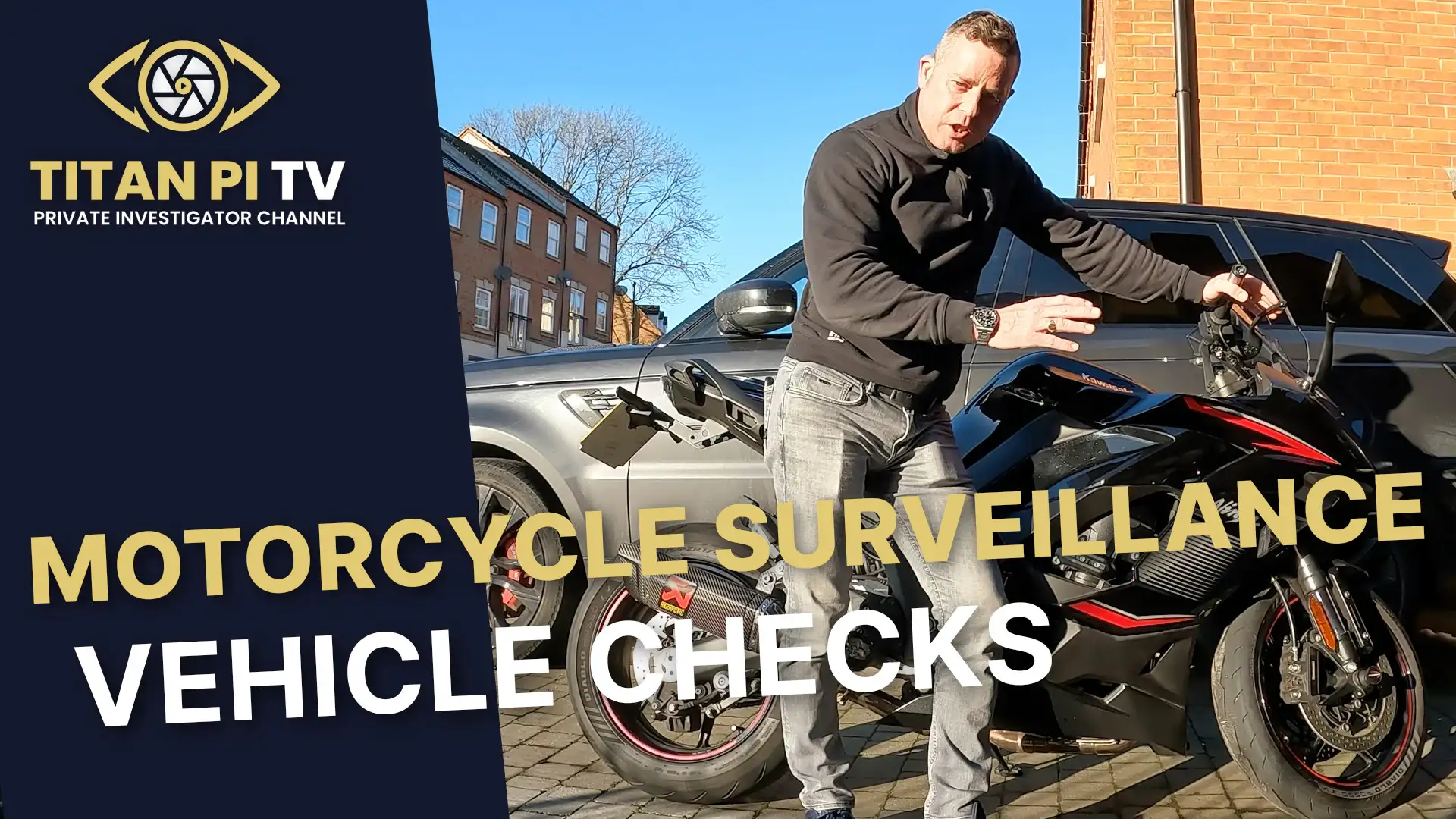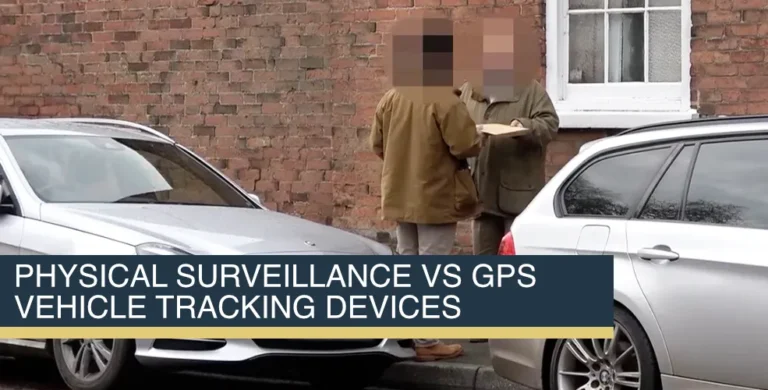Motorcycle Surveillance Pre-Ride Inspection
The POWDERY Method for Safe Surveillance
Motorcycling, while exhilarating and practical, carries inherent risks that can be mitigated with proper maintenance. Thousands of accidents each year are attributed to mechanical failures, many of which could have been prevented through routine inspections. For professionals like surveillance operatives, reliability isn’t just important—it’s critical. A sudden breakdown or performance issue can compromise an entire operation. The POWDERY method is a simple, systematic approach to pre-ride motorcycle checks, offering a quick yet comprehensive way to ensure your bike is in optimal condition.
This method not only improves safety but also boosts confidence, knowing your motorcycle is ready to meet the demands of the road, whether it’s a high-stakes surveillance mission or a regular commute. Let’s break it down step by step.
Petrol (Fuel): Ensuring Sufficient Range
Checking Fuel Levels
Fuel is the lifeblood of your motorcycle. Start by turning on the ignition to check the electronic fuel gauge. If your motorcycle lacks a gauge, open the fuel tank and visually inspect the level or perform the “shake test” by gently rocking the bike to gauge the amount left.
Fuel Requirements for Surveillance
Surveillance operations often extend beyond their anticipated timeframe, making a full tank essential. Refuelling mid-operation not only disrupts your mission but could also risk losing sight of your target.
Actionable Tip
Always fill up your tank before embarking on a ride, especially for professional tasks. Consider carrying a small reserve can for extended trips in remote areas.
Oil: Maintaining Engine Health
Checking Oil Levels
Locate the dipstick or sight glass, depending on your bike model. Ideally, check the oil level while the bike is upright on a paddock stand. Some motorcycles require the engine to be briefly warmed up before an accurate reading, but always refer to your owner’s manual for specific guidance.
Warm vs. Cold Oil Checks
While there’s ongoing debate about the best conditions for oil checks, prioritise safety and convenience. If the engine is cold, ensure the bike has been stationary long enough for the oil to settle.
Actionable Tip
Keep a small bottle of the correct grade of oil handy for top-ups. Check your oil weekly or before long rides to avoid running low.
Water/Coolant: Preventing Overheating
Locating Coolant Reservoirs
Coolant reservoirs are often tucked away in less obvious spots, so you may need a flashlight to locate them. Popular brands like BMW and Honda often place them behind panels for aerodynamic purposes.
Checking Coolant Levels
The coolant level should sit between the minimum and maximum markers. Low coolant levels can lead to engine overheating, which not only damages components but could leave you stranded.
Actionable Tip
Add coolant as needed, using the type specified in your motorcycle manual. Avoid mixing different coolant types, as this can reduce efficiency.
Damage, Drive Chain/Shaft: Identifying Potential Issues
Comprehensive Visual Inspection
Walk around your bike, paying close attention to mirrors, foot pegs, fairings, and lights. Look for cracks, dents, or loose components that may compromise performance or safety.
Drive Chain or Shaft Checks
For chain-driven bikes, inspect the chain for proper tension and lubrication. Use a ruler or your hand to check slack; refer to your manual for the correct measurement. For shaft-driven bikes, check for oil leaks near the casing.
Actionable Tip
Clean and lubricate your chain after every 500 miles or after riding in wet conditions. This extends the chain’s lifespan and prevents rust.
Electricals: Ensuring System Functionality
Basic Electrical Checks
Inspect the functionality of your lights, indicators, horn, and brake light. Test your ABS warning light to ensure it turns off once the bike starts moving, indicating the system is functioning correctly.
Troubleshooting Electrical Problems
A non-functioning light could be as simple as a blown fuse or loose connection. Familiarise yourself with the location of your fuse box and carry spare fuses.
Actionable Tip
Keep a portable multimeter in your toolkit to diagnose electrical issues on the go. Regular electrical checks can prevent surprises during critical rides.

Rubber (Tyres): Maintaining Optimal Grip
Tyre Tread and Condition
Inspect tyre tread depth using a tread depth gauge, ensuring it meets the legal minimum (1mm in the UK, but 3mm is recommended for optimal safety). Look for cuts, bulges, or signs of uneven wear, which may indicate alignment issues.
Checking Tyre Pressure
Use a reliable tyre pressure gauge to ensure both tyres are inflated to the manufacturer’s recommended PSI. Proper inflation not only improves grip but also extends tyre life.
Actionable Tip
Invest in puncture repair kits and tyre sealants for emergencies. Check tyre pressure weekly, especially if you frequently carry extra loads or passengers.
You (Rider): Assessing Personal Fitness
Mental and Physical State
Your bike is only as safe as its rider. Evaluate your mental clarity, physical condition, and emotional stability before every ride. Fatigue, stress, or distractions can drastically impair your decision-making and reaction times.
Factors Affecting Riding
Certain medications, even over-the-counter ones, can affect your focus. Ensure you’re well-hydrated, adequately rested, and dressed appropriately for the weather conditions.
Actionable Tip
Practise mindfulness or quick breathing exercises before embarking on high-pressure rides. Your mental and physical well-being should never be overlooked.
Steering and Suspension (Advanced): Fine-Tuning the Ride
Steering Check
Turn the handlebars from lock to lock, ensuring smooth movement without resistance or unusual noises. Check for free play in the steering head bearings.
Suspension Check
Inspect forks and shock absorbers for leaks or damage. Adjust suspension settings according to your weight and riding style, particularly if you’re carrying extra equipment for surveillance.
Actionable Tip
Have your suspension professionally serviced annually to maintain performance and safety.
Conclusion: POWDERY as a Lifesaving Habit
The POWDERY method is more than a checklist; it’s a vital habit for responsible motorcyclists. Regular pre-ride inspections not only prevent mechanical failures but also ensure peak performance during critical operations like surveillance. By incorporating this method into your routine, you minimise risks, enhance safety, and improve your overall riding experience.
Remember, maintenance isn’t just about the machine—it’s about protecting lives, including your own. Whether you’re navigating urban streets or remote terrains, POWDERY equips you to ride with confidence. Make it a non-negotiable part of your motorcycle preparation, and let every journey start with peace of mind.
Require more information about corporate investigation services?
For further advice and information about how Titan Private Investigation Ltd can help you with your corporate investigation requirements, please speak to one of our professional team members at one of the offices nearest to you.
London Motorcycle Surveillance Training – Call the Titan Investigations London Office 020 39046622
Birmingham Motorcycle Surveillance Training – Call the Titan Investigations Birmingham Office 0121 7162442
Cambridge Motorcycle Surveillance Training – Call the Titan Investigations Cambridge Office 01223 662022
Derby Motorcycle Surveillance Training – Call the Titan Investigations Derby (Head Office) 01332 504256
Leeds Motorcycle Surveillance Training – Call the Titan Investigations Leeds Office 0113 4574066
Leicester Motorcycle Surveillance Training – Call the Titan Investigations Leicester Office 0116 2436520
Nottingham Motorcycle Surveillance Training – Call the Titan Investigations Nottingham Office 0115 9646950
Manchester Motorcycle Surveillance Training – Call the Titan Investigations Office 0161 3023008
Sheffield Motorcycle Surveillance Training – Call the Titan Investigations Sheffield Office 0114 3499400
Truro Motorcycle Surveillance Training – Call the Titan Investigations Truro Office 01872 888706
Alternatively, you can contact us directly using our fully confidential contact form at enquiries@titaninvestigations.co.uk or chat directly using our Live Chat facility, and one of our Corporate Investigations team will get right back to you.













